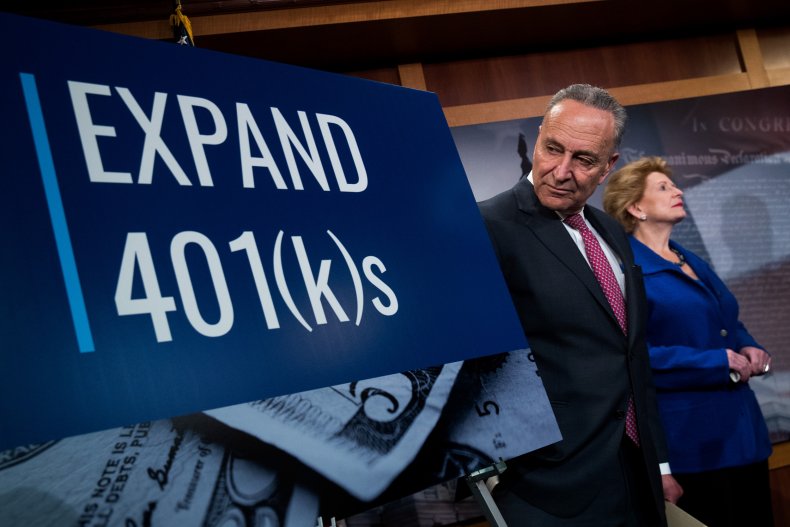How Much to Contribute to 401k? Tips, Advice and What to Avoid
Americans can save for their retirement by investing in a 401(k) plan, whose name is taken from the section of the U.S. income tax code that created it. The employer-sponsored retirement program allows employees to contribute a portion of their wages towards different investment options, such as stocks and bonds.
The amount of the contribution depends on the individual and some employers will match a portion of an employee's 401(k) contribution. The contribution amount "has to stay within two sets of limits: those set by the federal government and those set by your employer," says the Financial Industry Regulatory Authority (FINRA).
For a traditional 401(k) plan, taxes on contributions, any earnings from the investments and funds matched by employers are deferred until the savings are withdrawn.
However, "with a Roth 401(k), your contributions are made after taxes and the tax benefit comes later: your earnings may be withdrawn tax-free in retirement," explains Investor.gov, a website from the U.S. Securities and Exchange Commission.
See the Internal Revenue Service website for more information on other types of 401(k) plans available.
How much should I contribute to my 401(k)?
The FINRA says: "Many experts in the retirement field believe a ballpark amount is somewhere around 10 percent of your earnings. But it can be more or less, depending on your personal circumstances.
"If your company offers a match, you should contribute at least enough to get the full benefit of the match, otherwise you are leaving money on the table.
"And keep in mind that even if you are automatically enrolled at a certain level (say 3 percent), this is often a minimum amount to save for a secure retirement. Consider increasing this amount, perhaps significantly, to give yourself a better shot at accumulating a robust retirement nest egg," the FINRA advises.
Individuals can either raise or lower the amount of their monthly contribution as often as their employer allows, which could only be once a year or more often depending on the company.
Know your limits
The government's annual 401(k) contribution limit is capped at a specific dollar amount. For 2021, the limit is $19,500, "subject to cost-of-living adjustments," the IRS says. The limit is raised periodically to reflect increases in inflation.
Employers can limit 401(k) contributions to a percentage of an individual's salary. FINRA notes: "You can't contribute more than the percentage of your pay that your employer lets you add to a 401(k) each year, even if that means you can put away less than the government's cap.
"On the other side of the scale, your employer may require a minimum contribution from any employee who wants to participate in the plan," it adds.
...and your fees
According to a 2011 AARP survey, over 70 percent of people with a 401(k) plan were reported to be unaware of the fees associated with their plan, while over 60 percent did not know the amount they were paying in fees.
In 2012, the U.S. Department of Labor introduced a rule requiring fees and other information relating to a 401(k) account be disclosed annually to individuals.
"Possible fees include investment fees for the funds, stocks, bonds and other investments you choose, individual service fees for things like taking out a loan from the plan or selling shares in a particular investment fund, administrative fees and more," according to the Consumer Financial Protection Bureau (CFPB) website.
"If you think the fees in your 401(k) plan are too high, you can ask your employer to find more cost-effective investment options or plan services," it advises.
What to avoid
Generally 401(k) plans come with a selection of different mutual funds that invest in stocks, bonds, or a mix of both.
There are two things those with a 401(k) plan should avoid, CFPB explains: "First, if company stock is offered, be sure it's balanced against other investments in the portfolio. Even if the stock is going through the roof, placing all your eggs in the company basket could be a recipe for disaster."
Secondly, individuals should avoid borrowing funds from the 401(k) account. "When money is pulled out of a 401(k) it isn't there to grow. Repaying the loan can also cut into contributions." This means those who lose their jobs would have to repay the loans in full or they could face tax penalties, the CFPB says.
For more information about 401(k) plans, see Investor.gov and the websites of the IRS and the Department of Labor.


